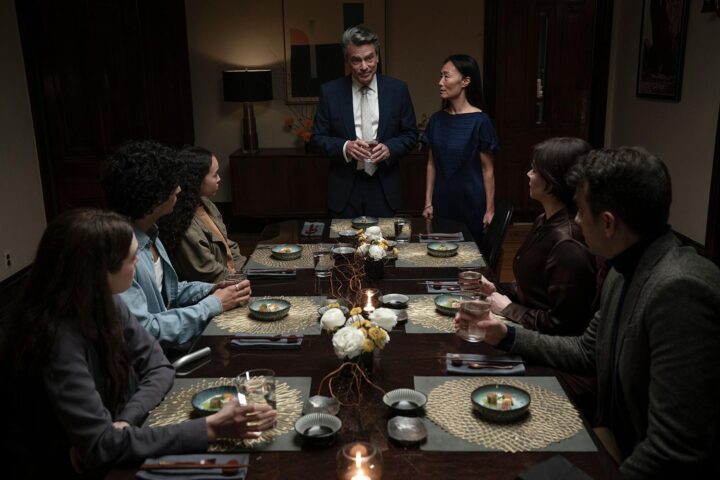Writer-director Marija Kavtaradzė’s keenly perceptive and delicately sensual Slow centers on a dance instructor, Elena (Greta Grineviciute), who’s just begun teaching a class for a group of deaf children. It’s there that she first crosses paths with Dovydas (Kestutis Cicenas), a sign language interpreter assigned to translate for the kids at every session. Elena and Dovydas’s profession both involve non-traditional means of communication, with each of them using their bodies, rather than verbal language, as a means of connecting with others. But where Elena exudes an impassioned sense of freedom as she twists and whirls around with her fellow dancers, Dovydas is necessarily both more exacting and restrained in his signing.
Given Dovydas and Elena’s opposing means of interacting with others, it’s perhaps expected that their initial flirtations have a slightly awkward opposites-attract quality to them, which is made charming by Grineviciute and Cicenas. And the very nature of their attraction is soon thrown into flux when Dovydas informs Elena that he’s asexual. Given the calculated nature of so many romantic dramas, it’s easy to imagine Slow building from here toward a traditional happy ending in which Dovydas realizes that he simply hasn’t met the right woman yet.
Kavtaradzė presents Dovydas’s asexuality neither as a crutch nor some sort of mental block that he must overcome. Slow steadfastly remains a character-driven piece, homing in on the intricacies of its protagonists’ psychologies and engaging with their subtle emotional shifts as they become more intimate with one another. And it’s through the sheer specificity of these observations, as well as Grineviciute and Cicenas’s instinctive, naturalistic performances, that Slow accrues its most penetrating insights into the nature of love, sex, and desire.
For as much as Slow focuses on two people in the throes of new love, it rarely indulges in rom-com clichés. Elena is a free-spirited young woman used to traditional sexual relationships, while Dovydas is new to experiencing an emotional connection strong enough that he’s willing to work to build something beyond mere friendship. And as the characters traverse unexplored terrain and deal with myriad frustrations, Kavtaradzė gives equal credence to Elena and Dovydas’s experiences, from their most bitter disappointments to their most emotionally gratifying highs.
Beyond its exquisitely granular precision, the film is notable for its levity, never diminishing the genuine spark of the couple’s connection in highlighting the troubles they face. It’s a careful balancing act to keep Slow’s tragicomic tone from slipping too far in either direction, but Kavtaradzė is in firm command of her craft, and the sun-dappled, docu-style cinematography lends the film an intimacy and tactility that further draws us into Elena and Dovydas’s little world. This is particularly evident in the film’s two sex scenes, during which the tiniest of joys, frustrations, and emotional manipulations converge in a rite of intensification.
The initial sex scene, in which Dovydas wants to finger Elena but she wants more, is tinged with an uneasy combination of tenderness and discomfort. But it’s the later sex scene, during which Dovydas tries to prove his manhood in bed while a third person snores away on the bedroom couch, that most directly, and distressingly, gets at the tensions underlying their relationship. These sequences are certainly memorable for their awkwardness, but they also get to the core of the characters’ preconceptions and sometimes subconscious expectations for where their relationship is heading and what they ultimately want out of it.
There’s a beautiful, subtly thorny scene late in the film where a drunk Dovydas tells Elena that he’s willing to have an open relationship to make things work, confronting his own jealousy by playfully asking, “What does it mean to be a man?” She’s taken aback—both amused and ever-slightly insulted by the insinuation that she’d want to sleep with someone else—but also forced to accept that they’ve yet come to a fully satisfactory agreement of how to be with one another. Dovydas goes on to ask, in frustration, “Who set the rules for everyone to live by?” Slow ultimately agrees with the couple, who conclude that there’s “no correct way to be together,” but as Elena and Dovydas discover, that doesn’t mean you never have to search for one.
Since 2001, we've brought you uncompromising, candid takes on the world of film, music, television, video games, theater, and more. Independently owned and operated publications like Slant have been hit hard in recent years, but we’re committed to keeping our content free and accessible—meaning no paywalls or fees.
If you like what we do, please consider subscribing to our Patreon or making a donation.



